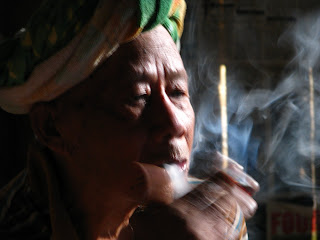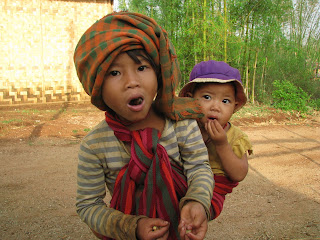
Note: This will probably be the only time during my 3-week trip to Myanmar (Burma) that I will be able to post to my blog. The heavy-handed government has blocked access to most internet sites, including blogs (even this blog) and most email accounts.
The first 4 times I tried to access this blog, I was met with this message: "Access denied. Your system policy has denied access to the requested url. For assistance, contact your network support team."
Fortunately, entrepreneurial twentysomethings are much more computer-savvy than middle-aged bureaucrats. Some brilliant guys at a cybercafe, using a proxy server, were able to circumvent this firewall.
Without further ado, my take on Myanmar.

******************
We decide to visit Myanmar (Burma) for two reasons: it’s closed to the world, and the world is closed to it.
Myanmar (Burma) has been ruled by a repressive military junta since the 1960’s, which locks the nation in complete isolation. It outlaws foreign companies from establishing a local branch. It outlaws taking Myanmar currency outside of the country’s borders, thus effectively shutting off all export-import commerce. It won’t allow books or magazines from other nations to come into Myanmar. It blocks web sites and even some e-mail servers. It stopped granting permission (visas) for foreigners to enter the country.
Of course, there are exceptions to all of this. The government DOES allow some foreign mineral-extraction companies to set up shop; high-ranking leaders take a large cut from this, as big as 5 percent, and live like kings. The government also tightly controls exports and imports, though the common people have established a thriving black market, on which they buy cheap Chinese imports with U.S. dollars.

Laypeople are so enthusiastic about getting U.S. dollars that they pay a pretty penny for it. The “official” exchange rate is 1 US dollar to 6.5 kyats. The government-owned banks will exchange 1 US dollar for 450 kyats. And the black market will trade 1 US dollar to 1,050 kyats.
The people of Myanmar led a popular uprising in 1988, followed by democratic elections in 1990. The military junta refused to acknowledge the results of the elections. They locked the leader of the democratically-elected party in house arrest. She remains in house arrest to this day. (She has been awarded a Nobel Peace Prize for her non-violent resistance to the military junta, though she couldn’t go to Norway to receive her Nobel, thanks to the house arrest.)
In response, the U.S. and other developed nations have imposed sanctions on Myanmar, further isolating it still. There’s hardly a nation on earth that’s been as cut off from the world as this one. (Yes, yes, except Bhutan. I know.)

But a few years ago, the Myanmar (Burmese) government, desperate to get dollars flowing, finally started granting tourist visas to those who filled out extensive application forms in advance.
That’s how we found ourselves at the Myanmar embassy in Laos, submitting forms, photos and a scheduled day-by-day itinerary of our trip to a visa application official. (We also signed a pledge that we would not get involved in Burmese politics or social issues in any way, shape or form.)
Thanks to her rubber-stamp of approval, we are now in Myanmar.
After flying into the airport, we started searching for someone with whom to share a taxi to the city center. We found a 50-year-old Dutch man carrying a duffel bag with 4 pairs of roller blades. That’s right, 4 pairs. Plus 4 helmets, 8 elbow pads, 8 knee pads, 8 shin guards. He said he brought the equipment for his kids. But then he said that he was alone. His kids live in Holland. And he flew straight from Holland to Burma (via Bangkok) and that he is flying straight back. So his story makes no sense. But hey, it’s none of our business.

We step outside and this 50-year-old Dutch man bursts into song. He begins singing a Burmese song that roughly translates into “shake your booty, yeah, shake it.” All the Burmese men start singing along, laughing, clapping. This guy can really light up a taxi terminal, even at 8 a.m. after a red-eye in coach.
"What brings you to Burma?" I ask him.
He grins mischieviously.
"I'm here to meet a 21-year-old French girl." He winks.
*******************************

Its 102 degrees in the capital, Yangon (Rangoon), with 100 percent humidity. This wouldn’t be so bad were it not for the fact that electricity only stays on for about 4 hours a day. Throughout most of the afternoon, the power fails. This means no fan. No fan! Nothing can cool you down. From 10 am to 5 pm, you feel like you’re living in a furnace.
All we can do is lie on the wooden floor of our guesthouse (the floor is cooler than the mattress) and wave a hand-held paper fan in front of our face.
We stare at our electric fan – a standard little tabletop fan – and pray that it kicks back into gear. (It doesn’t). We also drink water, despite the fact that the water, like everything else in the refrigerator, has turned warm.
Then we realized there’s one place in the city that has air-conditioning. The movie theater! The daily afternoon power cuts don’t affect them. They must own a generator, or maybe an on-site power station.
We clamor to see the 12:30 showing. We don’t care what the movie is. We just want the air-conditioning.
I’m literal when I say “THE movie.” There’s only one screen in the movie theatre. You don’t get a choice of what you want to see. You see whatever’s playing.
Tickets range from 50 cents to $2.20, depending on how good of seats you want. All seats are assigned.
We opt for a mid-range seat -- $1.20 – the cheapest of the balcony seats. Balcony is literally an “upper-class” experience, because it has stadium-style seating. The ground-level seats are on a flat surface.
Before the movie starts, a notice flashes on screen saying that everyone must rise in honor of the nation’s flag.
An image of Myanmar’s flag waving in the wind begins to play. The clip looks like it was shot in the 1950’s. It’s discolored, grainy and sped-up. The sound system crackles to life and begins to play an off-key tune which I can only assume is the national anthem.
The audience gets to its feet, but midway through the anthem, sits down.
The day we went to the movie hall, it was playing The Curious Case of Benjamin Button. But the power was “if-fy,” to say the least. The movie halts in its tracks three times as all the power in the movie hall fails. Fortunately the movie is never paused for long; after a minute or two, the screen kicks back to life. More importantly, the inside air stays cool.
I’ve never been a movie buff in the U.S. In fact, most movies bore me. I’d rather be reading. I don’t mean to sound pretentious. I don’t read Proust. I mean, I’d rather read an issue of TIME. Or Glamour. Or Mary Higgins Clark. I’ll read anything. I’ll read the back of a cereal box. (I won’t read Dickens. I hate Dickens.) Anyway, my point is, I don’t normally care that much for movies.
But here in Myanmar, I can understand the glory of a movie. I understand how, by watching a movie, you step into a magical other world. You receive a respite from the Burmese gruel, from the dogs, from the cracked haphazard concrete slabs, from the guys hanging off the sides of buses acting as human rear-view mirrors and yelling instructions to the driver. You escape it all for 2 hours. And you step into a clean, orderly, beautiful world.
Our world, or at least our immediate surroundings, will be changing again soon.
Today we’re taking a (not air-con) bus to Mandalay, where the temperature is predicted to be 108 degrees, and the air is said to be caked with dust.
Lets just hope they have power. All I want is a standard little tabletop fan.
****************************

So here’s what I’ve noticed about Burma:
•The country has a 1950’s classic feel. The cars are old British ambassador-models. The people are dressed smartly.
•The air smells of beetlenut, and the streets are stained red with beetlenut spittle.
•Sidewalks consist of haphazardly strewn cement blocks jutting every which way.
•The sidewalk has huge gaps between the cement blocks, at random intervals. An inattentive person could tumble five feet down into a gaping hole.
•People crowd the sidewalks selling fried bread, wristwatch bands, umbrellas.
•Dogs are sleeping everywhere. On steps leading up to a store. In sewer gutters. Everywhere.
•Someone is blaring Celine Dion at top volume.
•For an inexplicable reason, a man on the street corner is carrying a baby in a box.
•If I wear a Burmese outfit, I can pass as a local. This gets me into ancient monuments for free.
•If it rains too hard, sewage water spills out onto the street.
•Every man, woman and child wears an ankle-length wraparound skirt.
•The women slather thick chalky yellow cream on their cheeks. It’s supposed to be an extra-strong sunblock.
•We’re staying in the Muslim quarters. There are several mosques nearby and we hear the call to prayer five times daily once again. I realize that in spite of its hardships, I miss traveling in the Islamic world. I miss the delicate curves of Arabic script above doorways. It makes modern Egypt beautiful.
•The mosque across the street has a sign inside that says “Live like Ali, die like Husein.” I have no idea what this means.
•The architecture of the Buddhist temples in Myanmar are a perfect combination of Thai-style and Chinese-style, fringed with a fiery Burmese flair.
•I realize I’ve gotten really good at identifying artistic and architectural styles of individual Asian countries. I can easily spot the differences between Chinese, Thai, Cambodian (Khmer), Indian Mogul, and now Burmese.